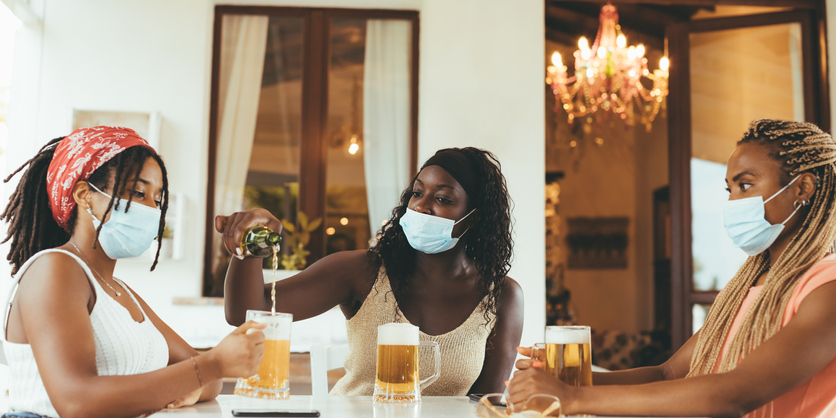The president's gloating about empty trauma units gives the ban on booze too much credit, but South Africans still need to re-evaluate their destructive boozing habits, as the current ban is costing the country about R2 billion in taxes and threatening more than 160 000 jobs

There have been mounting calls for a long-term solution to South Africans’ abusive relationship with alcohol, with lobbyists and industry bodies saying Covid-19 has laid bare the extent of the burden of destructive alcohol-induced behaviour.
According to the Southern African Alcohol Policy Alliance, considering the economic meltdown of the initial hard lockdown, the decision to extend the alcohol ban was based on all relevant factors relating to the saving of both lives and livelihoods.
Director Maurice Smithers said they urged the SA Breweries to withdraw the legal challenge to the ban on the sale of alcohol and for the restrictions to be relaxed. He, however, said what SA urgently needs is a lasting solution to the demon of alcohol abuse and resultant social destruction.
“We support (the ban) as a temporary measure, but we are much more concerned about what government’s long-term intention is because it is quite clear that we do have a challenge around the management of alcohol in the country. We are therefore calling on government to fast track the passing of the Liquor Amendment Bill, which will begin to change the way in which we relate to alcohol in SA and help to reduce alcohol related harm,” Smithers said.
He said they never called for an alcohol ban, but that they were confident that government had seriously considered all options and would not have taken the decision to impose the ban and extend it now.
Announcing that the alcohol ban would stay in place on Monday, President Cyril Ramaphosa gloated about how Chris Hani Baragwanath hospital’s usually packed trauma unit was empty during the festive season because of the alcohol ban.
Smithers said this could not be entirely attributed to the alcohol ban but also to the curfew and that it was only during the initial hard lockdown that the ease in trauma unit admissions could be entirely attributed to the alcohol ban.

For those who were wondering if lockdown regulations were in fact needed, the Chris Hani Baragwanath Academic Hospital has achieved a historic first under the amended lockdown level 3 regulations. Picture: Facebook, @ChrisHaniBaragwanath.
“We have a curfew now but not a complete lockdown. That tells you something. If the curfew is contributing to the reduction in alcohol related harm, even under level two and level one, when there was still a curfew, the levels of admissions to trauma units at hospitals has never risen to the same level that they were before Covid-19. Do we want to return there?” he said.
He said it was accepted that alcohol-induced harm was associated with people consuming lots of alcohol through the night and on weekends, and that more control was needed on the on-site consumption of alcohol.
Ban harming the economy and risking livelihoods
Agri SA has asked why not allow online sales of alcohol, wine farms to continue with wine tasting and sales to save what was left of the industry.
Christo van der Rheede, Agri SA’s executive director, said cabinet should rather work with the alcohol industry to launch a strategy to establish a culture that promotes the responsible use of alcohol.
“The impact of a total ban will completely destroy the economic contribution of the alcohol industry. There are strategies to keep the industry going and protect jobs. But it requires greater cooperation and exchange of ideas,” he said.

Picture: iStock
The SAB has lamented that it sustains over one million livelihoods throughout its extensive value chain, across farming, retail, manufacturing, logistics and many small businesses whose livelihoods were at stake.
The current 18 day alcohol ban may result in an estimated R2 billion loss in tax revenue from the alcohol industry, which was in addition to the estimated R25 billion in tax revenue lost across the economy as a result of the previous 2 bans spanning a total of 14 weeks during 2020.
“Our entire supply chain is affected by the series of alcohol bans. SAB’s value chain is wide-reaching and incorporates a total of 3,739 suppliers of which 1,345 are SMMEs, supporting in excess of 140,000 jobs. The longer we are unable to operate, the bigger the ripple effect,” SAB said in a statement.
According to SAB, the cumulative job losses from the previous two alcohol bans resulted in an estimated 165 371 job losses across the economy, that the first alcohol ban lasted 9 weeks and cost the SA about 117 000 jobs alone.
SAB said about R1, 5 billion in total revenue will be lost by the retail sector in the period, 15 December 2020 to 15th January 2021 and that the sector predicts that jobs will be lost in January 2021, given the projected loss of revenue.
“While we support adequate measures such as including an earlier curfew, reduced indoor and outdoor capacity at gatherings, and measured alcohol restrictions, we do not believe that the outright suspension of alcohol and beer sales is a sustainable approach. We are concerned that a 3rd ban – as an industry at large, cannot be sustained,” SAB said.
For more news your way, download The Citizen’s app for iOS and Android.
Support Local Journalism
Add The Citizen as a Preferred Source on Google and follow us on Google News to see more of our trusted reporting in Google News and Top Stories.






